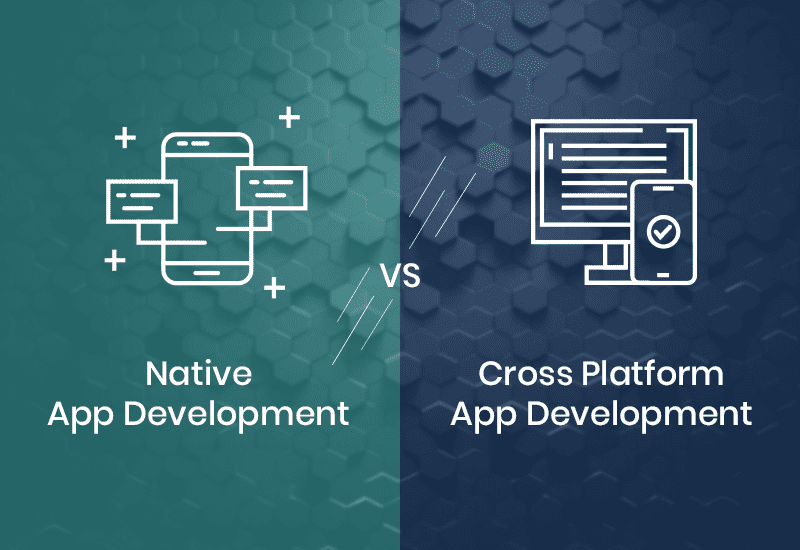Choosing Between Native and Cross-Platform Mobile App Development
Enhance User Experience and Revenue Generation When You Choose the Right Mobile App Development
Editorial Team
5 Min Read

In today’s mobile-first world, reaching customers on their favorite devices with the responsive, customized application experiences they expect is essential. The choice between native and cross-platform mobile app development will significantly affect those experiences, so selecting the right option for your audience is vital.
What Is a Native Mobile Application?
A native mobile application is designed for a particular operating system. Google’s Android and Apple’s iOS are the most common. Native apps are coded in a programming language specific to the operating system, such as Java or Kotlin for Android and Objective-C or Swift for iOS.
Native mobile app development requires tools such as operating system-specific software development kits (SDKs) and an integrated development environment (IDE). Because native apps are designed for specific operating systems and devices, they can access a device’s specific software and hardware, including:
- GPS
- The Microphone
- Push Notifications
- The Camera
Pros
A native mobile app offers several benefits, including:
- Better Performance: Native apps integrate with the device’s operating system to deliver faster, smoother, more efficient, and more responsive experiences. Apps have a consistent look and natural feel since they are created and optimized for the specific platform.
- Fewer Bugs: Native apps have immediate access to new features through updated SDKs. Developers can continually create smoother, safer, and more enjoyable user experiences. Native apps also have access to all the device’s features and functionalities for fewer bugs and improved performance.
- Tighter Security: Native apps are tightly integrated with the platforms they have been designed for. This integration enables them to use built-in security protocols that increase data security. Users can trust their information is protected, and companies can enhance their reputations for trustworthiness and security.
Cons
While native apps offer many benefits, they also come with a few limitations, such as:
- Higher Costs: Native app development requires two separate teams of developers for each platform, meaning employment costs will be higher. Creating and maintaining separate codebases for different operating systems will also increase costs.
- Longer Development Timelines: With two teams and no code reusability, developing and deploying applications can take time. Any maintenance and enhancement will also require considerable time and effort to ensure consistency across platforms.
What Is a Cross-Platform Mobile Application?
A cross-platform mobile application is compatible with different operating systems. These applications work from a single codebase that contains core features and functionalities, making it easy to develop apps for Android and iOS to reach wider audiences.
Developers can create cross-platform apps with a cross-platform framework designed by a private company. These frameworks use platform-specific SDKs from a unified API to easily access different libraries and platform SDKs. A few examples of cross-platform app development frameworks include:
- Flutter
- React Native
- Ionic
- Xamarin
Pros
Some of the primary advantages of cross-platform app development include:
- Faster Deployments: A significant benefit of cross-platform app development is code reusability — the opportunity to write code once and run it on different operating systems. Developers can reuse code to simplify development and get to market sooner.
- Lower Costs: Cross-platform app development only requires a single team of developers who specialize in cross-platform technology since the app will work for both Android and iOS. Lower labor requirements and faster deployment times can decrease overall project costs.
- Easier Maintenance: Developers work with a single, transparent codebase, making it easier, quicker, and more efficient to maintain applications. Every build uses the same code, which enables developers to ensure consistency and save time.
Cons
Cross-platform app development also poses a few challenges, including:
- Decreased Performance: Cross-platform apps require an additional abstraction layer to communicate between native and non-native components, meaning there is extra computation to result in slower response times. Cross-platform apps also have difficulty integrating with platform-specific features, so developers will need to have native app development skills to take advantage of those features.
- Limited Access to New Features: When a new SDK is released, cross-platform apps have to wait for a separate update before accessing the most recent features. This delayed access can lead to slower bug resolution and decreased performance.
Native vs. Cross-Platform Mobile App Development
Choosing between native and cross-platform app development is a significant decision that will influence user experiences, application success and revenue. The best fit will depend on a company’s main priorities and goals, such as:
- Budget
- Audience
- Development Timeline
- Performance
- Security
Choose native when priorities and goals focus on:
- Improved Security: If an application will handle sensitive information, native app development is ideal because it will grant access to the platform’s built-in security features for strong defenses and protection. Examples include social media and banking apps that collect private user data.
- Optimized Performance: Native apps are specifically designed for the operating systems they run on, making them the best option when performance and fast response times are essential. Gaming and graphic-heavy apps are a few examples of performance-centric apps that might require native app development.
Cross-platform application development is ideal when your goals and priorities center on:
- Faster Development Times: When the goal is to decrease time to market, cross-platform app development is the best option. Cross-platform app development can help get apps out early for feedback, testing and scaling.
- Lower Costs: Limited budgets or priorities to keep costs in check make cross-platform app development an enticing choice. These development options can help reduce costs for prototypes and testing ideas on a differentiated audience, enabling better and faster data collection.
How Can GDC Help With Cross-Platform and Native App Development?
GDC offers comprehensive app development services for your native and cross-platform app needs. Our developers are at your service, ready to assist with the entire mobile application development process, from design and integration to management and ongoing support.
When you partner with GDC, you’ll experience our:
- Personalized Approach: We work to understand your unique needs and application development requirements so we can deliver customized services that meet goals and expectations.
- Proactive Stance: Our experts will proactively learn about your business and explore the market so we can offer the best solutions and services for the application you plan to develop.
- Focus on Customer Experience: We know that the customer experience is vital, which is why we will help create positive, satisfactory, and responsive mobile experiences for native and cross-platform applications.
Work With GDC for Mobile App Development
GDC’s expert mobile application development services can transform the way you do business. Contact us online today to learn how our range of custom application development services can enhance user experiences and drive more revenue for your organization.




